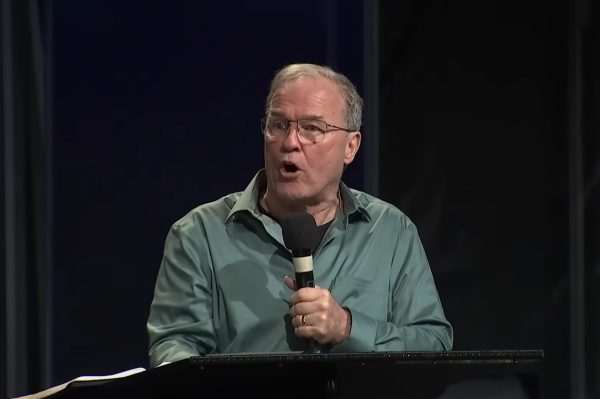Biblical Translation: Leaving Cultural, Political and Theological 'Biases' at the Door
Accurately translating the Bible from its original sources to modern-day languages has been the cause of much debate, especially in America, where political speech influences almost every aspect of society. But is it ever necessary to make Scripture "adapt" to the times to get the "good news" across?
Some experts argue that accuracy and truthfulness should be the strict points of concern when translating and interpreting the Bible; others, who see cultural influences as inevitable, have taken up projects to ensure the word of God is presented in the language most relevant to whichever culture it speaks to.
The Conservative Bible Project on Conservapedia.com, a website upholding conservative ideals, tailored after the Wikipedia model of users contributing their own information in building articles, is an effort to remove what it calls "liberal-bias" from modern Bible translations in America and emphasize conservative values – two of which it identifies as accepting the "logic" of a real, eternal hell and expressing free market parables.
According to the project, "Liberal bias has become the single biggest distortion in modern Bible translations." The three "sources of errors" when conveying biblical meaning, include, according to Conservapedia.com: "lack of precision in the original language, such as terms underdeveloped to convey new concepts introduced by Christ; lack of precision in modern language; translation bias, mainly of the liberal kind, in converting the original language to the modern one."
The final point is identified as the largest source of translation error, which Conservapedia.com says requires "conservative principles to reduce and eliminate."
The New Testament conservative version of the Bible was completed in 2010, and work is currently underway to translate the Old Testament. The Conservative Bible Project was launched in 2009 by Andrew Schlafly, a lawyer and the founder of Conservapedia.com. Schlafly, a Roman Catholic, is the son of conservative political and social activist Phyllis Schlafly.
In a 2009 interview with Stephen Colbert on "The Colbert Report," Schlafly described his vision of Conservapedia, and said that it was not experts, but "the best of the public" who contributed to the Conservative Bible Project. When asked by Colbert about who determines whom are the "best of the public," the lawyer explained that it was "the general jury" and that the truth becomes clear over time.
Ardel B. Caneday, Professor of New Testament Studies and Biblical Theology at Northwestern College in St. Paul, Minn., told The Christian Post the Conservapedia project seems "unnecessary."
"All translations are going to affect something from the culture in which they are translated and consequently every translation is going to reflect some bias. But the notion that we have to undertake some project to expunge all bias seems to be a mistaken one – because that translation is going to reflect some bias as well," the professor explained.
In regard to today's most popular modern English Bible translation, the New International Version, Caneday said he knows many of the translators who worked on it and that they hardly have a liberal bias. "Their (Consevpedia's) complaint seems to be overblown, in my estimation," he added.
Founder and president of TeachingTheWord Ministries, Dr. Paul M. Elliott is a frequent conference, seminar, and pulpit speaker. Elliott, who holds a doctorate in Biblical exegesis and has written four books and hundreds of articles and booklets, wrote in an article about Conservapedia on his website:
"The Conservative Bible Project is the work mainly of unregenerate men, using unreliable source texts, employing an ungodly translation philosophy. The result is an error-filled rendition of the Scriptures that can change literally every day." In the same article, Elliott identifies several verses in which he believes the Conservative Bible Project uses a flawed methodology.
One Convservative Translation (CT) Elliott examines, which he compares to the King James Version, is Romans 1:16:
KJV: "For I am not ashamed of the gospel of Christ: for it is the power of God unto salvation to every one that believeth; to the Jew first, and also to the Greek."
CT: "The gospel of Christ does not embarrass me, for it is the power of God leading to salvation all who believe: first to the Jew, and then to the Greek."
No analysis note is offered on Conservapedia for the translation choice, as with other passages. However, Elliott offers his own observation, writing: "The formulation 'leading to salvation all who believe' is acceptable to Roman Catholics and others who teach justification not by faith alone, but by a process of faith-plus-works."
In a phone interview with The Christian Post, the biblical scholar reiterated that the Conservapedia Project is a prime example of unnecessary cultural bias getting in the way of an accurate translation of the Bible.
He also identified the most important principles that need to be considered when translating and interpreting the Gospel: "We need to have the authentic source text – of course, that has been an issue that has been debated a lot. But translators who come to the Bible (and want to use) a proper approach must be faithful and accurate in translating it, and must to the extent that is humanly possibly, not impose our theological, political or cultural agendas."
Michael Currier, Director of Communications of The Seed Company, an organization launched by Wycliffe Bible Translators in 1993 with a mandate to accelerate Bible translation in countries without the Bible in their own language, shared with The Christian Post his take on the ethics of translation.
"The Seed Company focuses on translating languages that have no existing Scripture. Our focus is on all those communities who have no access to God's word. In English, we have such a multitude of translations that this issue (of politically biased translations) does not really touch us – we are focused out there, but we employ standards of translation that ensure accuracy.
"Generally, the precision issues are addressed with consultants that we work with, with people who are generally well-versed in the original languages who will check translations for accuracy in the original language."
Currier added: "To translate the Scripture into modern language, the receptive language, we work with local communities and speakers to ensure that the language is clear – meaning there is extensive testing that is done to make sure that the meaning is conveyed accurately in the language of the local people."
Dr. Elliott, however, shared that he thought such international translation efforts are also sometimes in error and take unneeded liberties when translating the word of God.
"Wycliffe Bible translations are doing some cultural translations that instead of referring to Jesus as the Son of God, they referred to him as God's 'uniquely intimate beloved Chosen one' – here it lends itself toward cultural interpretations," the biblical scholar said.
Elliott's complaint about Wycliffe's contextualization of the Scripture for some target groups, in this case Muslims, has been a point of consternation for other observers as well – so much that a petition has been launched in hopes of pressuring SIL International, Wycliffe and the Frontiers mission organization to reconsider the translation choices.
"The issue first and foremost is that we need to recognize the issue of the Bible as a religious book – it is in fact the Word of God – it is a supernatural book. We do not have the right as human beings to do that kind of manipulation of the text. We need to be faithful and accurate in translating it from the original language. It is not legitimate to do what is in fact not a translation, but an interpretation."
The theologian elaborated that although it is a challenge to remove all cultural influences from translation work, we need to understand them for what they are and try to translate and interpret the Scripture as accurately as humanly possible.
"Everyone is going to read the Bible from the lens of his culture, his upbringing, and those kinds of things. This is one of the reasons why faithful preaching and teaching of the Bible beyond simple translation is absolutely necessary," he said.
"The Old Testament was written in the context of Old Testament Israel and their culture, the New Testament – within Jewish and Roman culture, and people need to understand that – but to put those things (cultural interpretations) onto the Bible is certainly a problem," Elliott insisted.
The Christian Post was unable to contact a representative of the Conservative Bible Project, or Andrew Schlafly, its creator.






















